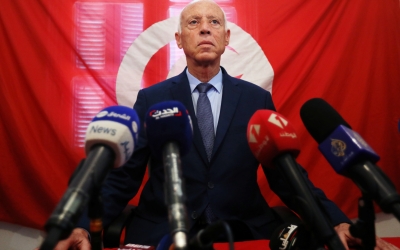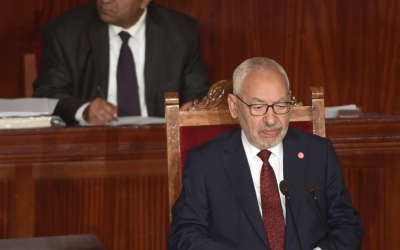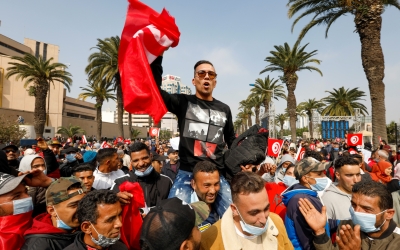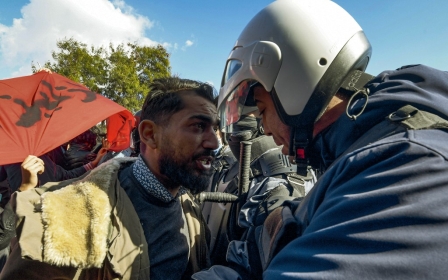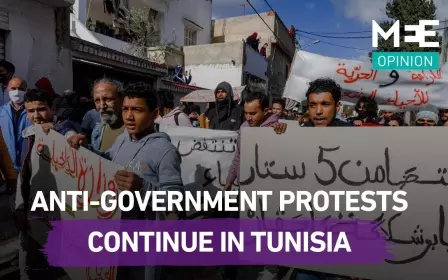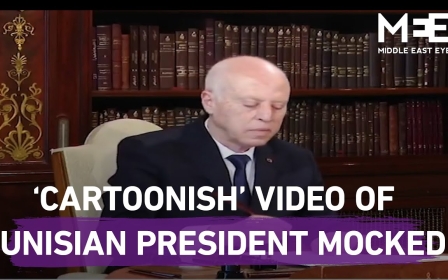Tunisia: Cabinet reshuffle deepens rifts in political establishment

A political stand-off between Tunisia's President Kais Saied, Prime Minister Hichem Mechichi, and a fragmented parliament is threatening to upend the country's fragile democratic transition 10 years after the outbreak of the Arab Spring.
The North African country, often hailed as the Arab world's only successful democracy after the 2011 uprisings, has been engulfed in economic and political turmoil since the 2019 elections that brought Saied, an independent, to power.
The same year also witnessed the election of a polarised parliament, where Ennahda, which describes itself as Muslim Democratic, now the largest bloc, failed to gain a majority.
'A cabinet made up of independents, as imposed by Kais Saied, was a step backwards'
- Abdelkarim Harouni,
Ennahda movement
The crisis was brought to the fore in mid-January, when Mechichi carried out a wide-ranging cabinet reshuffle, affecting in particular four ministers known for being allied to the president, who has in turn refused to swear in the nominees despite the approval of parliament.
The two largest parties in parliament, Ennahda and the liberal Qalb Tunis, have backed Mechichi in his dispute with Saied who has denounced the process of naming the new ministers as unconstitutional.
New MEE newsletter: Jerusalem Dispatch
Sign up to get the latest insights and analysis on Israel-Palestine, alongside Turkey Unpacked and other MEE newsletters
The 2014 constitution enshrined a mixed parliamentary-presidential system where conflicts would be settled through a constitutional court, which has yet to be formed due to political divisions.
The deadlock represents the climax of months of political conflict as the country struggles in the throes of an economic crisis.
Parties that threw their weight behind the divisive reshuffle argue that it was aimed at injecting some political colour into the largely technocratic government.
“To us, a cabinet made up of independents, as imposed by Kais Saied, was a step backwards,” Abdelkarim Harouni, president of the Shura council of the Ennahda movement, told Middle East Eye.
“It was as if we had no elections.”
However, Mechichi’s move broke apart the rickety truce in his relationship with Saied and plunged the country into yet another period of political uncertainty.
For almost two months now, amid a deep financial crisis and mounting debt figures, the government remains in limbo since the prime minister turned a deaf ear to the president's call to step down.
Changing loyalties
Mechichi, somewhat ironically, is a former protege of the president and was appointed in July last year as the successor to Elyes Fakhfakh, also a Saied nominee, who stepped down in June over allegations of a conflict of interest.
Once confirmed, major political parties perceived Mechichi's nomination as a power grab.
“Mechichi was not among the names proposed by political parties. Supposedly he was the most docile,” Harouni says.
“Saied then placed his confidants in the new government.”
Among their names were former interior minister Taoufik Charfeddine and former justice minister Mohamed Boussetta, both sacked by Mechichi in January.
Charfeddine was Saied’s former campaign leader in the coastal city of Sousse and Bousseta was a close colleague of his wife, Harouni said.
However, people around the president who spoke with MEE say it was all for the sake of public interest.
“Saied aimed to create stability. Therefore, confidence was the most important selection factor,” Saied loyalist Malek Ezzahi says.
“In addition, he wanted to reserve key portfolios for people without party affiliation.”
Seen from this angle, Ezzahi explains, picking Mechichi was somehow “natural”.
“A man with a similar profile to the president: no political party affiliation and no political experience,” Ezzahi says.
'Kais Saied cooperates with the parliament as an institutional entity, but is entirely devoid of party politics'
- Khalil Abbess
“He was the only independent in the previous government and already known as interior minister and adviser to the president. Unfortunately, he now betrays Saied and conspires with the political parties,” Ezzahi added.
Ezzahi belongs to a self-portrayed “non-institutional organically evolving network” informally led by Saied that stems from the Kasbah sit-ins that followed the 2011 revolution after the expulsion of old-regime ministers.
It takes a different mindset to understand the new way of doing politics, Saied’s inner circle says.
“Kais Saied cooperates with the parliament as an institutional entity, but is entirely devoid of party politics. Compared to his predecessors, he invites a lot more ‘ordinary people and movements’,” Khalil Abbess, a member of the same network as Ezzahi, says.
However, this is the second presidential appointment in over a year-and-a-half that has ended in a political gridlock.
“Next time we will involve more civil society organisations in the process,” Ezzahi pledges.
Flaws in the system
Such stories reveal, according to the president and his ardent supporters, the inherent design flaws of the country’s barely 10-year-old semi-parliamentary democratic system.
“We are facing heavy burdens and harsh impacts where some would want us to believe that we are still in a transitional phase that they wrongly describe as democratic," Saied said mid-February in a handwritten (publicly released) letter to Mechichi.
“This is only so on the surface. In truth it is a transition from a single party to a single group of corrupt people.”
Ennahda figurehead Harouni, on the other hand, claims that the corruption allegations solely serve as an excuse to discredit parliament. “The president is creating a fairy tale of a battle between the good and clean president and the thoroughly corrupt parliament.
“It’s part of a well-developed plan to sabotage the legitimacy of parliament,” Harouni added.
Yet, a rising number of Tunisians believe he is fighting a rearguard battle.
Ten years of unremitting chaos and political crises make it hard to win an argument with a fast-growing number of people who call for a system change.
To Saied’s network this was doomed to happen.
“The system was already dead before it was established. It could never work,” Abbess said, describing Tunisia’s first post-revolutionary electoral law of May 2011 as “a defeat”.
“We have learned from parliamentary democracies elsewhere. The system so far produced something you can rightly call ‘a political class’ alienated from its citizens and obsessed with self-preservation,” Abbess added.
The Saied network
Some eight years later, in his 2019 presidential campaign, Saied, branded as the candidate “without a party, a programme or a budget,” repeatedly called the country’s democratic system anachronistic and political parties obsolete.
His allergy to party politics, wrapped up in the slogan “I was, I am and I will always be independent,” garnered over 70 percent of the votes in the second ballot.
By voting en masse for anti-establishment candidates, in the embodiment of both Saied and anti-establishment political parties, Tunisians seemed to want to create space for the beginning of a new political cycle.
However, as Harouni analyses, the political fallout created the effect of a self-fulfilling prophecy.
'Saied is the main culprit of today’s crisis. He imposes a new democratic system because he apparently lacks the patience to wait for a constitutional amendment'
- Abdelkarim Harouni,
Ennahda
“Saied is the main culprit of today’s crisis. He imposes a new democratic system because he apparently lacks the patience to wait for a constitutional amendment.”
Here, although implicitly, Harouni puts a spotlight on the main reason for why Saied decided to run for president: to make Tunisia a kind of bottom-up democracy, a self-designed “from the local to the centre” concept.
Within this framework, directly chosen local assemblies, which emerged spontaneously during the 2011 revolution, would gain more weight than the parliament and the president would compose the government, rather than political parties as is constitutionally the case today.
“A model that, in terms of direct democracies, goes beyond existing European concepts,” Harouni says
“To make this happen, he relies heavily on ‘behind the scene’ advisers and confidants such as the director of the presidential cabinet, Nadia Akasha, his brother Naoufel and his wife.
“I think their support for Saied’s project was the main screening factor.
“Nadia is highly influential. She even attends meetings to which the prime minister is not invited.”
In the same way, press and critics have often raised questions about “the rules” of Saied’s appointments, pointing out the high proportion of appointees without any political experience.
Between them were a close former colleague, Rachida Ennaifer, and a journalist, Hella Lahbib, who had offered Ennaifer an interview trumpeting the innovative nature of the then freshly elected president. They both left in quick succession after only a few months from having been appointed.
Close colleagues
At this point, after one-and-a-half years in office, Saied’s network says the president primarily focuses on personality and certain knowledge.
“His staff consists of people, old acquaintances he trusts and who gained a lot of experience in the Tunisian administration, to get him to settle in,” Ezzahi claims.
“Nadia Akasha, for example, is one of the president’s students. A woman from a modest family. She is more of an academic than a politician,” Ezzahi, a Saied ally, says, “and loyal to the president.”
But Ezzahi argues that their influence is limited. “Saied makes his decisions alone. He is far too stubborn to be influenced,” he told MEE.
Besides, Khalil Abbes argues, “falling back on permanent advisers does not match our philosophy”.
On another level, despite Saied’s unusual style, some figures from the traditional Tunisian establishment made it into his entourage.
That includes Tunisia’s powerful trade unions, for example, which have been calling for a referendum on the system since shortly after Saied took office.
“We have fostered that rapprochement,” says Abbes. “The unions bind different groups of Tunisians together.
“Our role is to provide and introduce dialogue partners, but we can differ.”
Neither the network nor Saied, however, has yet begun to put their democracy plans into practice.
“There was no time for that because of the chaos created by political parties,” Ezzahi concludes.
Middle East Eye delivers independent and unrivalled coverage and analysis of the Middle East, North Africa and beyond. To learn more about republishing this content and the associated fees, please fill out this form. More about MEE can be found here.


